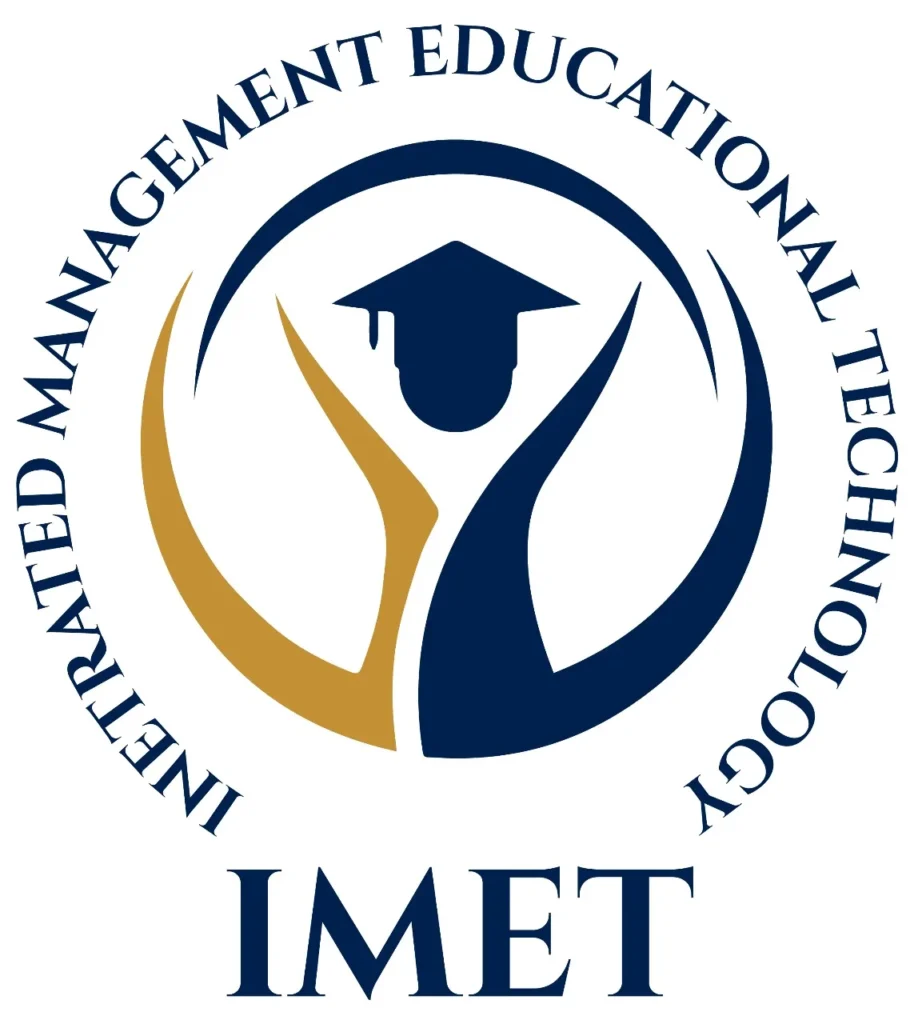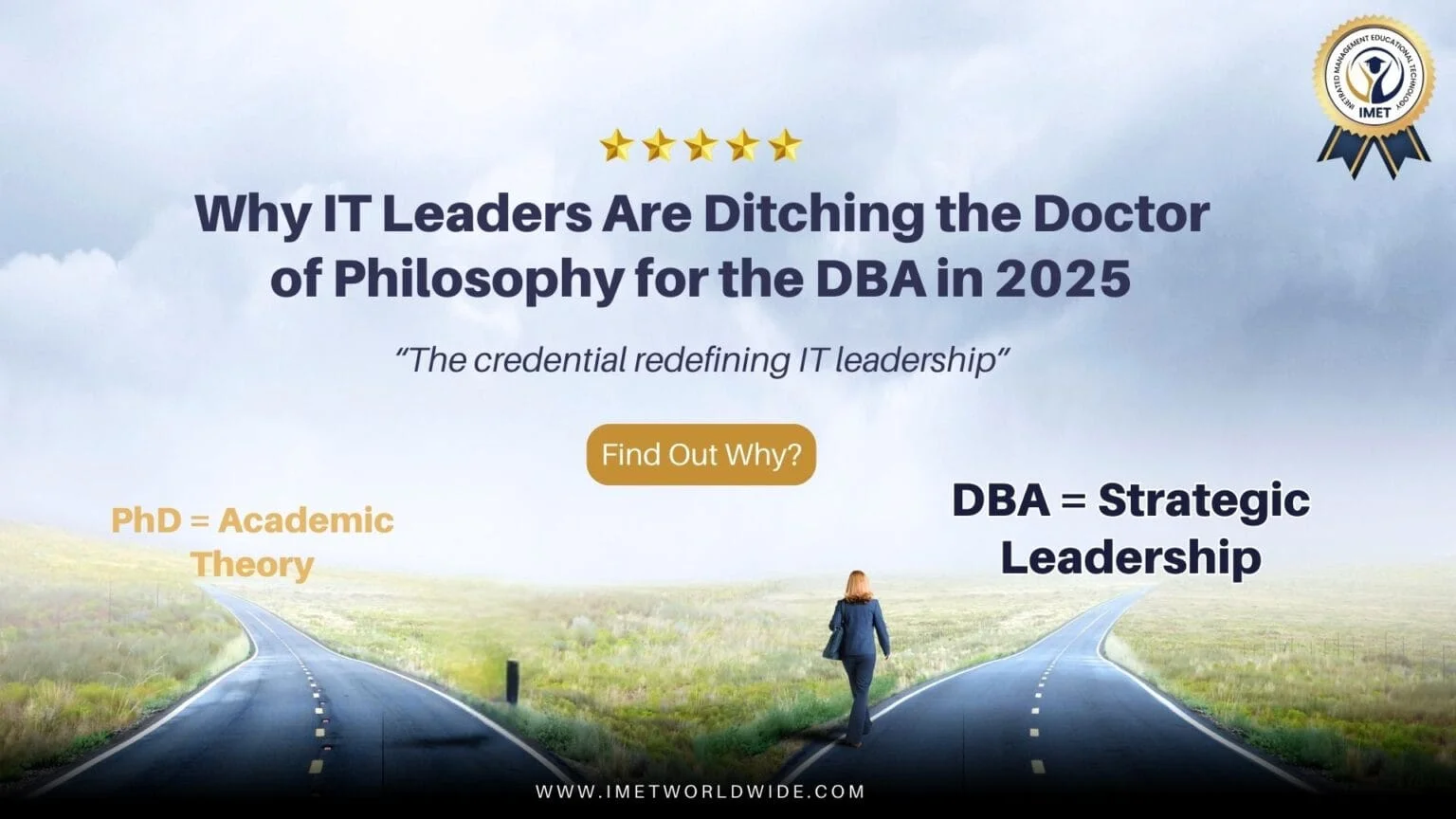Introduction
The Doctor of Philosophy in Business Administration, or more generally, the PhD in Business, has long been seen as the pinnacle of academic and intellectual success. It has long been regarded as the route for people who want to increase knowledge, participate in academic research, and pursue careers in academia and teaching. However, things are drastically changing in 2025.
CIOs, CTOs, CISOs, and leaders of digital transformation are favoring the Doctor of Business Administration (DBA) over the conventional PhD in a variety of industries, but particularly in the fast-paced field of information technology. Why? Because the business environment of the twenty-first century requires not only in-depth theoretical knowledge but also applied expertise, worldwide visibility, and research that has an immediate impact.
IT executives are realizing that their doctoral education should not only inform but also transform their leadership influence in an era characterized by global disruption, rapid digital transformation, cybersecurity threats, and artificial intelligence (AI). The DBA excels in that situation.
For ambitious leaders who wish to blend executive authority and innovation, the DBA has emerged as the preferred business doctorate degree. The PhD primarily develops academics and is concerned with theoretical, academic output; whereas the DBA focuses on applied research and enables students to develop new ways to address industry problems. In essence, the PhD develops scholars; while the DBA develops leaders.
The PhD vs. DBA Divide
To comprehend this transition, we must analyze the Doctor of Philosophy in Business Administration versus DBA discourse.
The Path to a PhD
Focus: Theoretical development and pure academic research.
Audience : The target audience is universities, peer-reviewed journals, and academic groups.
Results: The results are journal articles, contributions to academia, and possible teaching jobs.
Timeframe: Usually 5 to 7 years of very intense study, with few chances to use what you learn in the real world.
The DBA Path
Focus: Research that solves real problems in business and technology.
Audience: boards, top leaders, global industries, and the executive community.
Result: useful frameworks, case studies, thought leadership, and strategic visibility.
Timeframe: Usually three to four years, with programs designed to help working adults, often through online DBA programs.
It’s easy to see the difference between a DBA v/s PhD. The PhD helps scholars and teachers grow, while the DBA helps professionals and new ideas grow. The DBA is the clear winner for IT leaders who need to make a strategic impact right away.
Why IT Leaders Prefer the DBA in 2025
- Applied Research Is Needed for Digital Transformation
These days, IT executives are in charge of cloud platform migration, cybersecurity resilience, AI adoption, and the creation of interconnected digital ecosystems. These obligations call for more than just scholarly understanding; they call for useful tactics.
Leaders who hold a doctorate in business administration are able to create research initiatives that specifically target issues in their companies. For example:
- A CIO may concentrate on AI governance frameworks before implementing research results to establish moral AI policies for their organization.
- Stronger organizational defense strategies could result from a CISO’s dissertation on cybersecurity resilience models.
The DBA is far more applicable to the realities of digital transformation than a conventional phd in business administration programs because of this degree of applied research.
- A quicker return on investment in time and effort
An online DBA program’s ability to provide career value while leaders are still enrolled is one of its main benefits. A DBA is intended to be integrated with continuing executive work, in contrast to a PhD, which may take six months to yield noticeable results.
Advantages consist of:
- Utilizing research findings while enrolled in the program rather than years later.
- Publishing research articles that are pertinent to the industry and increase authority and visibility.
- Establishing real-time professional capital and credibility.
The DBA is a much more strategic choice for time-pressed executives because of its quicker return on investment.
- Establishing a Personal Brand and Digital Presence
Managing internal operations is only one aspect of being a successful leader in 2025. Thought leadership and external visibility are essential for the modern C-suite. This is facilitated by a DBA, which allows executives to:
- Make available research papers and case studies reinforcing personal branding.
- Get invites to panel discussions, keynote addresses, and consultations.
- Use the title “Dr.” in industry reports, at international conferences, and sites like LinkedIn as an indicator of authority.
The outcome? A DBA graduate becomes a respected voice in their field in addition to receiving a degree.
- Global Recognition and Career Mobility
IT executives seek credentials that are globally recognized in today’s interconnected digital economy. Nowadays, a lot of online DBA programs guarantee that their graduates gain the following advantages:
- Embassy attestation and WES approval guarantee that credentials are recognized worldwide.
- Chances to reach a wider audience and publish globally.
- Establishing connections with experts from various fields and locations.
The DBA offers a passport to global credibility for CIOs and CTOs seeking global positions or consulting opportunities.
The DBA: The New Authority Symbol
The Doctor of Philosophy in Business has historically been linked to academia and the unadulterated quest for knowledge. However, in 2025, authority in IT leadership is derived from a combination of visibility, influence, and knowledge—all of which are strengths of the DBA.
A DBA dissertation develops into a strategic tool rather than just a scholarly document. Research findings frequently serve as case studies, whitepapers, or frameworks that have direct relevance to executive decision-making. Additionally:
- Dissertations are turned into materials for branding.
- In leadership circles, research papers are used as visibility tools.
- Having a digital presence helps you establish credibility over time.
In this way, the DBA is a leadership accelerator rather than merely an advanced degree.
Challenges Leaders Face When Choosing Doctoral Paths
Despite its benefits, misunderstandings cause many executives to hesitate when comparing a DBA to a PhD. Typical worries include:
“What is the duration of a doctoral dissertation?”
Although DBAs are typically 150–250 pages long, they are more applied and focused than PhDs.
“What are the available doctoral degrees?”
EdD, DBA, PhD, and so forth. However, the DBA is the most focused on industry and leadership.
“How many years will it take?”
While DBAs are typically 3–4 years long and designed for professionals, PhDs can last 5–7 years.
“Will my brand be strengthened by this degree?”
Indeed. With the help of publication and visibility strategies, a DBA can become a branding powerhouse.
Why IMET Is the Partner of Choice for DBA Aspirants
Working closely with senior professionals at IMET, we’ve seen why they choose the DBA. Our programs focus on career transformation and visibility in addition to academic rigor.
How IMET Assists Executives in Their DBA Path
Individual Mentoring: Ensures that research projects are both relevant, industry related, and aligned with executive goals.
Publication and Visibility: Transformation of dissertations into case studies, articles or papers for global publication.
Impact-Oriented Frameworks: Research is in line with contemporary issues like cybersecurity, artificial intelligence, and digital transformation.
International Recognition: WES approval, embassy attestation, and international recognition.
Support for Digital Branding: Assisting executives in turning research into industry presentations, visibility assets, and LinkedIn content.
From Research for Doctorates to Career Change
The DBA is much more than just another academic degree for IT executives. It accelerates one’s career by:
- Translates executive experience into influence in publications.
- Transforms research into tools for branding and visibility.
- Puts leaders in a position of authority and recognition worldwide.
In addition to helping professionals obtain a business doctorate, we at IMET want to give them the authority, credibility, and visibility they need to succeed in the digital age.
Conclusion
IT executives are not pursuing the conventional PhD programs in business administration in 2025. The DBA, a doctorate that is in line with the realities of the digital age, is what they are opting for instead.
The DBA offers leadership visibility, worldwide recognition, and opportunities for applied research to CIOs, CTOs, and CISOs. The DBA develops visionary digital leaders, whereas the PhD develops scholars.
The decision is obvious: the DBA is a strategic doctorate for leaders navigating AI, cybersecurity, and digital transformation, not just an academic credential.
FAQs
Q1: Why do IT leaders prefer DBA over PhD in 2025?
DBA is applied, focused on industry, it builds leadership credibility and digital visibility compared with PhD which is lower value academically.
Q2: How long to complete DBA?
Usually 3-4 years, flexible structures, work-life commitments, online DBA.
Q3: What is the difference between a doctoral dissertation in DBA vs PhD?
PhD dissertations are heavily theoretical, while DBA dissertations are practical frameworks addressing real-world problems.
Q4: Can a DBA help with self-branding and visibility?
Yes. Publishing, speaking opportunities, and global recognition turn DBA graduates into thought leaders with strong personal brands.
Q5: What research areas are trending for IT leaders in DBA programs?
Cloud adoption, digital transformation tactics, cybersecurity resilience, AI ethics, and digital disruption unique to a given industry.
Q6: Are doctoral degrees worth it for senior executives?
Absolutely—if it’s the right program. A DBA creates career capital, executive influence, and global visibility, making it highly valuable.





